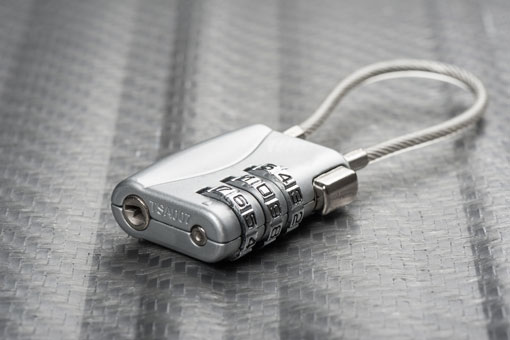 As a smart traveler you want to be using the latest travel technology. But if you're using a luggage lock approved by the Transportation Security Administration or if your bag has a zipper, your bags are not secure.
As a smart traveler you want to be using the latest travel technology. But if you're using a luggage lock approved by the Transportation Security Administration or if your bag has a zipper, your bags are not secure.
An article published in the Washington Post ran pictures of the master keys that can open every TSA-approved lock in existence (though the pictures have since been removed.)
These detailed photographs – which were published last year but recently began circulating online – have now been used to create files for 3D printers that allow anyone to 3D-print their own master keys to TSA-accepted locks.
Since 9/11, passengers flying to or within the US have been required to use TSA-approved locks that can be unlocked by one of seven master keys held by a few higher-ups in the TSA, allowing travel sentries to search bags without having to damage the locks or bags.
Without access to a master key, baggage handlers, hotel staff and others in the luggage transport chain should not be able to open these locks. Yet that's the fatal flaw – the master key, or backdoor into a supposedly secure system.
Security researchers say the situation with the exposed TSA master keys illustrates the problem with such “backdoors”, whether of the physical sort, or the cryptographic backdoors that the FBI has been campaigning tech companies to build into encrypted communication systems. Cryptographic backdoors would allow law enforcement to investigate illegal activity on smartphones - as well as enable criminals to steal sensitive information.
Of course, no luggage lock would put off a determined thief for very long. In fact, it's been shown that all you need is a ballpoint pen to break into a suitcase. You can use a pen to unzip a suitcase and then zip it back up again. You won't even notice it's been opened. See how in the video below.
So what should the air traveler do to secure his or her baggage? There's no truly secure solution, but you can deter would-be thieves by buying a bag that's zipperless, like the Samsonite S'Cure Spinner 28 ($189.94 on Amazon) or Samsonite F'lite GT Spinner 31 ($155.13 on Amazon), and using your own lock when you're not flying. Of course, the best security measure is to keep your valuables with you.
[Image Credit: TSA Lock via Shutterstock]















From Hideki Yamada on September 14, 2015 :: 2:48 pm
You guys are missing a point. It is not about the hackability of any TSA lock. Of course, you can hack one. The point is that thieves go for easier targets. If there is a lock, that slows them down, and since there are plenty of other unlocked ones, they would move on. A TSA lock cannot prevent anyone who has zeroed in on that piece of luggage because that is the only one that the thief is interested in. But if your luggage is just one of many, then it can redirect the bad guys. This is what a TSA lock, or virtually any luggage lock, is for.
Reply
From Josh Kirschner on September 14, 2015 :: 3:02 pm
With a TSA master key, opening a locked bag takes only a fraction more time than an unlocked one. And if you’re locking the bag in your hotel room, thieves have plenty of time to do either opening method. And having a lock on your bag may have the unintended effect of advertising that you have something in your bag you are trying to protect, making it a more appealing target. After all, if there is nothing of value in your bag, why are you locking it?
The answer here is to never put valuables in your bag, then it doesn’t matter what you do as far as locking.
Reply
From Jenna on November 08, 2016 :: 9:12 pm
I’ve had hotel maids steal silk blouses, scarves and even shoes. That’s a pain for those of us who travel light. If a locked piece of luggage is broken into at least you have proof to take to the hotel manager.
Reply
From Doug Clinton on March 03, 2017 :: 2:35 pm
I agree but should I take my pistol in my carryon when I travel? Having a secondary, secure container inside the bag, that is attached to the bag is what works for me. Is it a perfect solution? No, there is none. The point is to make the thief go for the easier target. My steel, biometric portable gun safe is a good answer.
Reply
From Bob Goldie on May 02, 2018 :: 12:45 pm
Baggage handlers may not be willing to be caught with a key. So having a lock may deter some.
Reply